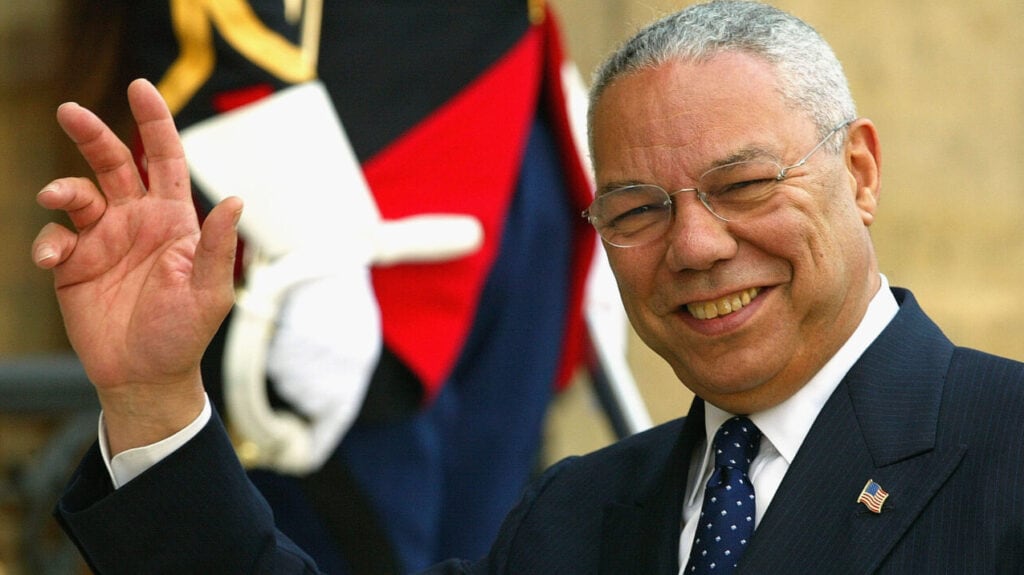Powell walked so that America’s first Black president Obama could run
OPINION: Powell’s flirtation with the 1996 White House race had a massive impact by opening the American mind up to the idea of a Black president.
The year was 1995 and the most popular, beloved, admired person in America was General Colin Powell. He’d steered the American military through a quick Gulf War that had kicked Saddam Hussein out of Kuwait and he’d led the American people through a series of press conferences where he conveyed gravitas, thoughtfulness, and an august charisma.
Powell was serious, candid, to the point, and very likeable. He had a clear “Powell Doctrine” for military operations — find clear political objectives and employ overwhelming force. In a nation still weary from the Vietnam quagmire and still shell-shocked by the violent complexity of the Middle East which we seemed to keep getting wrong over and over, this man seemed like someone who could accomplish things most people could not.
Both Democrats and Republicans fell in love — something that’s unthinkable today but it really happened.
U.S Secretary of State Colin Powell waves as he arrives in the courtyard of the Elysee Palace on June 5, 2004 in Paris, France. (Photo by Pascal Le Segretain/Getty Images)
So yeah the year was 1995 and Powell had just released his autobiography, My American Journey, and as he toured the country to promote it these gigantic, adoring crowds came out to see him and it seemed like the beginning of a presidential campaign. It was said that he was considering it and the country went nuts — imagine kids screaming for the Beatles but it’s white adults flipping out over… a Black man who could become president of the United States.
Powell was clearly proud to be Black but he didn’t make a big deal about race — Jesse Jackson had run for president in 1984 and 1988 and he had seemed like the senator from Black America. Powell was not that. People were clamoring for him so fervently that the White House seemed to be his if only he said he wanted it. Powell was a leading presidential contender who had not even made it clear which party he would run from.
For a few months, millions of Americans talked about and envisioned Powell as their president and found the image very pleasing. People have to visualize things before they can accept them as a reality and Powell allowed us all to see what a Black president could look like and people were fine with it. But, behind the scenes, Powell was torn. He wasn’t sure what he wanted. He wrote a speech saying he was running for president but never delivered it.
Instead, after a few months of thinking about it, he called a press conference and said he lacked “the fire in the belly.” He did not want to go through the stress and pressure of running for president. That incredible grind was not for him.
Secretary of State Colin Powell briefs the press on the latest diplomatic developments the State Department March 17, 2003 In Washington, DC. (Photo by Mike Theiler/Getty Images)
Still, Powell’s flirtation with the race had a massive impact on America — it opened the American mind up to the idea of a Black president. Twelve years later when another charismatic and serious Black man emerged, America had already visualized what a Black POTUS would look like. It was a little easier to see Obama in the White House because we had already conjured the image of Powell being there.
Powell helped clear a path for Obama in the collective mind of America. Powell walked so Obama could run. Of course, Obama stood on the shoulders of so many ancestors from Jesse Jackson to Shirley Chisolm to Doug Wilder, but I’ve always thought that General Powell was a critical force in pushing Obama up over the top of that impossible hill and he never got enough credit for it.
Touré is the host of the podcasts Toure Show and Democracyish and the podcast docuseries Who Was Prince? He is also the author of six books.
The post Powell walked so that America’s first Black president Obama could run appeared first on TheGrio.

